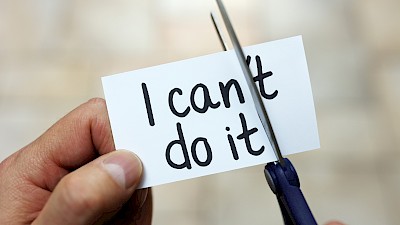
Self-confidence on the job
Self-confidence on the job
You have the feeling that you are not good at your job and are very self-critical? Your demands on yourself are higher than those on the people around you? Do you feel uncomfortable talking and expressing your opinion in front of other people? Quite a few people suffer from low self-confidence at work or in their private lives and thus put the brakes on themselves and their careers. The causes of low self-confidence are very diverse. Past experiences made in childhood, at work or with family or partners are often the basic trigger for feelings of inferiority. But failures of a professional or private nature and the failure to meet the demands of others can also have a strong influence on self-confidence. In this blog article you will learn about the importance of self-confidence in the job, where self-esteem comes from and how you can build up your self-confidence in the job.
What does self-confidence mean on the job?
Self-confidence is not only important in private life - especially at work it is important to be convinced of one's own competences and knowledge and thus to appear competent and capable. Strong self-confidence at work is the source of productivity and effectiveness. If you are self-confident and believe in yourself and your abilities, you will be more motivated to do your job and often perform better. A self-confident appearance therefore opens doors for you in the professional world. Because better performance and the art of being able to present and sell your successes and strengths well is attractive to your current and potential employers and increases your chances of a promotion or the job of your dreams. At the same time, self-confident people are often more satisfied in their jobs. Self-confidence at work often leads to a higher level of self-esteem. People who see themselves as capable and competent feel more comfortable in their skin and pay more attention to themselves. This makes it easier for them to express their own opinions, stand up for themselves and build better relationships with colleagues and superiors because they appreciate honesty and openness.
Self-image, experience & motivation: The origin of self-confidence in the job.
Whether in a private or professional context - a healthy self-confidence helps you go through life more positively and be more successful in the process. But where does self-confidence on the job come from? Basically, self-confidence is built on one's own experiences.
- Previous successes: If you have been successful in the past, you believe you can do it again, even in challenging situations.
- Supportive environment: Appreciation from your colleagues and bosses as well as the opportunity for growth and development and support can boost confidence in your skills.
- Positive feedback: If you receive recognition for your work from work colleagues, the boss or customers, this confirms your abilities and shows that you are capable of doing a good job.
- Personal values and beliefs: If you have a strong sense of self and a clear understanding of your values, you can have the confidence to stand up for yourself and your beliefs in the workplace.
- Positive self-image: Having positive self-talk and focusing on your strengths and past successes rather than defeats can boost your self-esteem.
12 tips for more self-confidence at work
Even if you are currently suffering from low self-confidence at work, this does not mean that you cannot change your situation. Because self-confidence is not static and can be trained. The following tips will help you to increase your self-confidence at work and soon walk more confidently through your private and work life.
1. self-reflection: know your strengths & weaknesses
Self-reflection is an important tool to boost your self-confidence on the job. By taking the time to reflect on your past experiences and achievements, you can gain a better understanding of your strengths and weaknesses and identify areas for growth and development. Often you become so preoccupied with your negative qualities that your strengths are pushed into the background. Therefore, focus primarily on your strengths. Knowing what you like to do and are good at gives you a sense of confidence in your abilities and helps you stand up for yourself.
2. step by step to the goal: set yourself small goals
Instead of pursuing one big goal, it is advisable to set smaller step goals. Waiting a long time for the project to be completed and thus successful can often lead to becoming more and more insecure along the way. Small successes in between help you not to lose faith in yourself, to always remain confident and to gain self-confidence in your job.
3. your opinion counts too: take a stand & express your ideas
In a conversation with a customer, in a meeting or in an exchange with colleagues, it's all about exchanging opinions, looking at problems from different angles and finding common solutions. Your opinion also plays a role in this. The more often you say no, represent your own point of view in conversations and possibly convince your conversation partners, the more confident you will become in communicating your opinion. This point also applies in job interviews or salary negotiations. Do appropriate self-marketing and don't let your counterpart sell you as inferior.
4. self-confidence on the job: accept challenges
Whether it is new tasks or more responsibility - leave your comfort zone and accept new challenges. When you successfully tackle challenging tasks and expand your skills, you not only prove to your boss that you are capable, but also show yourself what skills you actually possess. When you succeed, it boosts your confidence on the job and shows that you are up to the task. 5.
5. Surround yourself with supportive people.
The environment you are in plays a big role. If you are oppressed or discouraged by people you interact with on a daily basis, this can have a negative impact on your confidence on the job. Instead, if you spend time with uplifting people who encourage you in what you want to do and only want the best for you, it will manifest itself in more satisfaction and self-confidence. So if you find that you are surrounded by too much negativity over a long period of time and your colleagues are dragging you down, you should consider whether a clarifying talk or even a change of team or department might do you good.
6. respond in an uninhibited way: Practise being critical
In the working world, praise and criticism often go hand in hand. Whether in an appraisal interview, during a project or after a customer meeting - confrontations with criticism occur from time to time. Instead of vehemently deflecting it with justification or sinking into self-pity, you want to deal with it constructively. Take criticism to heart and develop yourself on the basis of it.
7. self-confidence: Making mistakes on the job does not mean failing
It is normal to make mistakes from time to time. However, it is important to deal with them properly. While you should certainly own up to mistakes and take responsibility for possible consequences, blowing it out of proportion is not advisable. Don't plunge into self-doubt, but take the event as an opportunity to learn from your mistakes and avoid them next time.
8 Understanding productivity for more self-confidence on the job
Self-confidence at work is directly related to your own productivity. Often, too little self-confidence holds you back. Doubts about oneself dominate everyday work and have a negative impact on productivity. But lack of concentration can also reduce your self-esteem the other way round. Therefore, try to find out how you work most productively and test out the different possibilities. 9.
9. adopt an attitude: The role of body language, expression & eye contact.
With positive posture and communication, you convey to your counterpart that you are confident and authoritative. With your posture, body language and charisma as well as pleasant eye contact, you can therefore influence how your colleagues, managers and customers perceive you. If the person you are talking to shows you respect and trust, this is often reflected in how they perceive you and pushes your self-confidence on the job.
10. comparisons promote insecurity
Do you have the feeling that your colleagues complete tasks faster, are assigned better projects or are praised more often than you? Don't constantly look at what your supposed competitors are doing, but concentrate on your personal strengths and successes. The constant sideways glance creates insecurities and makes your expectations of yourself constantly rise.
11. good preparation leads to more composure
A confident appearance is easiest when you are well prepared and know exactly what you are talking about. Therefore, in the run-up to supposedly threatening presentations or before a customer meeting, inform yourself about the topics and people you will be dealing with in your job and prepare yourself for conversations and meetings. Making notes and bullet points will give you confidence and lead to more self-confidence on the job in the long run.
12. compliment yourself: Accept compliments & celebrate your successes
Have you successfully completed a project, finished a task particularly quickly or simply written a good email? Accept compliments for even the smallest thing. By seeing and understanding the image others have of you, your self-perception can also change. Occasionally congratulate yourself on what you have achieved and praise yourself for your successes after a particularly challenging day at work.
Conclusion: Self-acceptance for more self-confidence on the job
Self-confidence plays an important role on the job. But self-confidence should not be confused with arrogance. Those who are at peace with themselves, know their strengths and weaknesses and stand up for themselves are demonstrably more successful in the professional world. Awareness of oneself is gained from various sources. Basically, however, it is previous experiences and interactions with different people that influence the view of oneself. Those who have low self-confidence can gradually build it up with a few tips. Reflecting on one's own competencies, choosing a positive environment and training in critical faculties and expressing one's opinion, among other things, can contribute to this. Don't be discouraged by setbacks. Not every day can be good and gaining confidence and self-awareness on the job is a process. Need more techniques to boost your confidence on the job? With our self-confidence training, you will learn to be self-assured and confident at work.








